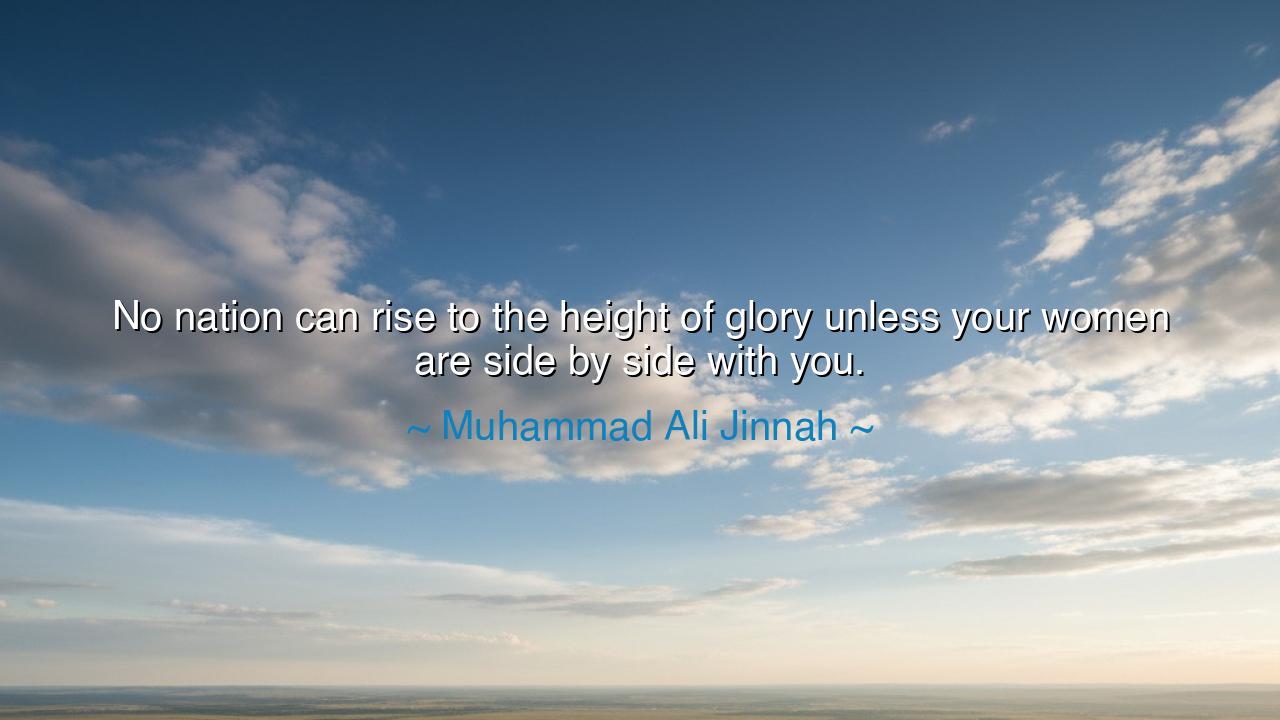
No nation can rise to the height of glory unless your women are






Muhammad Ali Jinnah, founder of Pakistan and architect of a nation’s destiny, once proclaimed with prophetic force: “No nation can rise to the height of glory unless your women are side by side with you.” In these words lies both a command and a revelation—that a people cannot ascend while half its strength lies shackled. To keep women behind veils of silence is to cripple the march of progress, but to let them stand beside men is to unleash the full measure of a nation’s power.
The origin of this declaration arose in the crucible of Pakistan’s birth. Jinnah, who carried the burden of leading millions through the storm of partition, knew that survival would require more than soldiers and politicians. It would require teachers, healers, builders, and leaders drawn from both men and women alike. His vision was not of women confined, but of women risen, carrying the banner of progress alongside their brothers.
History confirms his wisdom. In the days of early Islam, women like Khadijah, the Prophet’s wife, and Aisha, the scholar, were not hidden figures but central pillars of faith and leadership. Khadijah’s wealth and wisdom sustained Muhammad’s mission in its most fragile hour, while Aisha’s knowledge became a light for generations. Their example stands as eternal proof that no civilization achieves greatness by silencing half its people.
So too in modern times, we see this truth in the story of Fatima Jinnah, sister of Muhammad Ali Jinnah, who stood as his closest ally and later as a leader in her own right. Known as “Mother of the Nation,” she championed education and political participation for women, embodying the very principle her brother proclaimed. Her life reminds us that the words Jinnah spoke were not empty rhetoric, but a blueprint for the nation’s survival and flourishing.
Therefore, O children of tomorrow, engrave this wisdom upon your hearts: the march of a nation is not carried by men alone, but by the union of man and woman, shoulder to shoulder. A people who confine their daughters confine their destiny; a people who free them open the gates of glory. For no nation can rise while half its sky is kept from shining.






YTVu Ngoc Yen Trang
This quote is a powerful reminder of the need for gender equality in all aspects of life. It’s striking to think about how many women throughout history have been sidelined despite their potential to contribute to society. In modern times, what are we doing to ensure that women have the same opportunities as men to influence the course of a nation? Could this be the missing key to unlocking greater prosperity?
DTLam Duc Tri
Jinnah’s perspective seems to suggest that a nation's true potential is unlocked only when it fully engages all of its citizens, especially women. This raises an important question: How do we change the deeply ingrained societal norms and systems that still marginalize women in many parts of the world? Could this quote serve as a call to action for women’s empowerment in all corners of the globe?
NPBang Tam 12A8 35 Nguyen Pham
The idea that a nation can only achieve greatness if women are treated as equals is compelling. But why is it that in some places, women still don’t have the opportunities to rise side by side with men? Does this mean that those nations are holding themselves back from reaching their true potential? How can we encourage a more inclusive environment where everyone—regardless of gender—can contribute to a nation's success?
CPChi Phuong
This quote strikes a chord in me, especially as it highlights a crucial aspect of social progress—gender equality. In a modern context, are there still countries where women aren't equally recognized in contributing to national success? What needs to be done to uplift women in every society so that the nation as a whole can thrive together? Jinnah’s words remind us that true strength comes from unity and inclusion.
DCle duc cuong
Muhammad Ali Jinnah’s words speak to the potential of a united nation. It makes me wonder—how many nations have failed to reach their full potential simply because they restricted women’s involvement? If women were side by side with men in every area—politics, business, education—would the world be a different place today? What barriers must still be broken for this vision to become reality?